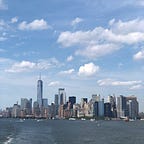Great Moments in Legal Industry Regulation: The D.C. Bar’s Word Games
The District of Columbia prohibits “[engaging] in the practice of law [there] … unless enrolled as an active member of the D.C. Bar.” Construed practically, the provision means that an attorney without a District license cannot appear in its courts or falsely hold himself out as authorized to practice in Washington. But legal regulation is a hodgepodge of bureaucratic and economic protectionism cloaked in a canard of serving the public weal. Thus the rule is construed to mean that an attorney who lives in the District cannot do work on behalf of clients anywhere unless she also holds a D.C license. As noted in the April 8, 2019 edition of The Federalist Society Review: “Regardless of the disclaimers made on business documents, an attorney with an office in D.C., who is a member of the bar of Maryland or Virginia (but not D.C.), and whose practice consists exclusively of representing residents of those states in the courts of those states or concerning transactions in those states, is practicing law in the District of Columbia and violating [the rule].”
The rule poses a particularly thorny problem during the pandemic for homebound lawyers who live in the District but are licensed elsewhere. What are these attorneys supposed to do? Endless laps around the Beltway just to call clients? Hours in a Chevy Chase Starbucks parking lot close enough to the building to use the WiFi? The bar exam debacle of 2020 — with its stunning combination of bureaucratic ineptitude and utter disregard for the physical safety and well-being of applicants — provides a stark reminder of the risk of assuming that legal industry regulators are sensible. The bureaucrats who judge the competence of other members of the profession are empowered by the cognizance of their own exclusion from such rigorous scrutiny. The already-licensed are hardly immune from the same stupidity and cruelty which led to bar examinees being denied access to bathrooms and prohibited from bringing their own tampons to a testing center.
The pandemic offers a great opportunity to introduce a more sensible regulation that better reflects the realities of today’s practice, where transactions and relationships frequently cross arbitrarily-drawn political boundaries. The D.C. bar should prohibit lawyers from appearing in its courts or falsely holding themselves out as licensed there. But pandemic or not, a lawyer from New York with a townhouse in the District shouldn’t be precluded from drafting a document for a client in Syracuse just because the geographic scope of his licensure stops at the Pennsylvania state line. That does nothing to protect District denizens and businesses.
Unfortunately, legal industry bureaucrats do not regulate sensibly. They play word games to make themselves important, and instead of using the pandemic as an opportunity to introduce a common-sense construction to a poorly-drafted provision, the D.C. bar’s Committee on the Unauthorized Practice of Law went through a tortured process of rules-analysis to carve out a half-measure designed to revert to the inane status quo as soon as the virus abates. As explained by commentator Nicole Black and reported in the Detroit Legal News:
The committee … reviewed the commentary to the rule for additional insight. Notably the commentary explained that the “incidental and temporary practice” exception was intended to apply “where an attorney with a principal office outside the District of Columbia is incidentally and temporarily required to come into the District of Columbia to provide legal services to a client.”
Finally, the committee turned to the likely factual scenario presented by lawyers working from D.C. during the pandemic and concluded that their remote work fell within the exception. Specifically the committee determined that lawyers who are not licensed in D.C. “may practice law from the attorney’s residence in the District of Columbia under the ‘incidental and temporary practice’ exception of Rule 49(c)(13) if the attorney (1) is practicing from home due to the COVID-19 pandemic; (2) maintains a law office in a jurisdiction where the attorney is admitted to practice; (3) avoids using a District of Columbia address in any business document or otherwise holding out as authorized to practice law in the District of Columbia; and (4) does not regularly conduct in-person meetings with clients or third parties in the District of Columbia.”
This isn’t rule-making for the benefit of the public and practitioners. It’s regulation for its own sake; judges, bureaucrats, and “thought leaders” imposing arbitrary and unnecessary mandates to reinforce their own power and importance. Some accommodation had to be made, but the D.C. Bar ceded as little ground as possible on an emergency basis without giving up any long-term control. The result is a fundamentally flawed, plutocratic mess. A homebound attorney can do work in the District but not receive mail there? A lawyer has to maintain an office in another jurisdiction to which she potentially cannot travel for an extended period of time? Such senseless rules may make bureaucrats look and feel important, but their effect is to increase the cost of providing legal services and consequently raise fees. Do regulators in D.C. and elsewhere not realize that the majority of Americans already can’t afford legal services? Or do they just not care?
Once again a legal industry rule-making body supposedly dedicated to public service has used its power to reinforce its own significance. It is unacceptable for bureaucrats to cloak turf-protection in the guise of concern for consumers, and long past time for those who govern the bar to start aspiring to the same ethical standards they demand of practitioners. If public protection is truly the goal, an accountable body of regulators is the first step.
